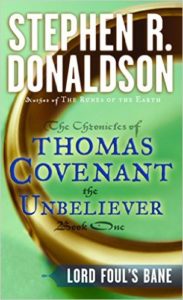The Christian Part Of Christian Speculative Fiction
 From my first involvement in writing and publishing, I’ve been confronted with the question, overtly or by suggestion, what is Christian about this novel? Ten years ago Christian fiction was know for conversion scenes. As in, a character who was not a Christian came to faith in Christ. The end.
From my first involvement in writing and publishing, I’ve been confronted with the question, overtly or by suggestion, what is Christian about this novel? Ten years ago Christian fiction was know for conversion scenes. As in, a character who was not a Christian came to faith in Christ. The end.
Even some of the early speculative titles didn’t stray far from that template, though the stories included fantastical elements.
But as with other fiction, readers began to demand something more. Often the complaints centered on the preachiness of the novels, and I have to agree that some stepped out of bounds—the author took over the story to tell the readers the truth about salvation.
The key to good fiction has always been to show, not to tell. And stories are about characters, so they are the ones readers want to hear from. They don’t want authors to interrupt the story for an explanation moment, no matter what the topic.
In the early years of Speculative Faith, I wrote about this subject. In part, here’s what I was thinking:
[I read] an article [Stephen] Donaldson wrote entitled “Epic Fantasy in the Modern World” . . .
To begin with, it seems pertinent to look at his definition of fantasy:
Put simply, fantasy is a form of fiction in which the internal crises or conflicts or processes of the characters are dramatized as if they were external individuals or events. Crudely stated, this means that in fantasy the characters meet themselves – or parts of themselves, their own needs/problems/exigencies – as actors on the stage of the story, and so the internal struggle to deal with those needs/problems/exigencies is played out as an external struggle in the action of the story.
A somewhat oversimplified way to make the same point is by comparing fantasy to realistic, mainstream fiction. In realistic fiction, the characters are expressions of their world, whereas in fantasy the world is an expressions of the characters.
Would we Christian SFF writers agree with this definition? Or are we, instead, using fantasy to dramatize the spiritual world at large, rather than the spiritual world of a particular character?
I wonder if it isn’t stories that dramatize the spiritual world at large that don’t take on a redundant feel.
 In other words, I was thinking about the possibility that Christian speculative writers were not doing justice to our individual experiences. Instead, we were writing to a template, to what we thought a person had to believe in order to be a Christian. So if someone was to convert, we had to satisfy all the important requirements. There really weren’t stories about thieves on the cross converting moments before they died. Or corrupt government agents promising to make amends with those they cheated and to proceed honestly from this point on. Or prostitutes showing their repentance by lavishing expensive perfume on the One who had forgiven them. Or paralyzed men jumping up and carrying their pallets as they leaped and praised God. Or men freed from demons, sitting clothed, in their right minds, and begging Jesus to join his followers.
In other words, I was thinking about the possibility that Christian speculative writers were not doing justice to our individual experiences. Instead, we were writing to a template, to what we thought a person had to believe in order to be a Christian. So if someone was to convert, we had to satisfy all the important requirements. There really weren’t stories about thieves on the cross converting moments before they died. Or corrupt government agents promising to make amends with those they cheated and to proceed honestly from this point on. Or prostitutes showing their repentance by lavishing expensive perfume on the One who had forgiven them. Or paralyzed men jumping up and carrying their pallets as they leaped and praised God. Or men freed from demons, sitting clothed, in their right minds, and begging Jesus to join his followers.
None of those conversions looked the same.
But the conversions in Christian fiction seemed all too similar, to repetitive.
The answer many Christian writers have come to is that we simply need to stop writing about conversion. I’ve suggested that not every story needs to be about how life with Christ began. But I do think conversion stories are important.
For my own series, my hope is that Christians would feel comfortable giving the books to people who don’t know and follow Jesus, in order to initiate a discussion about Him.
But the issue I was mulling over ten years ago, is still something to consider, I think. If we include a conversion in our stories, are they true to our character, or are we writing an “Everyman” conversion?
In fact, will a conversion be readily identified as a conversion? Or will readers have to stop and think about what has happened to the character and what is likely to happen in the future. It’s that kind of story that is the most compelling, I think.








































